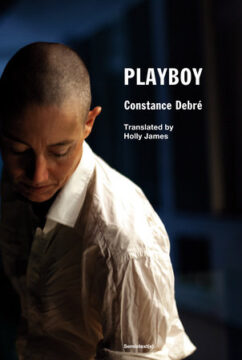Christine Smallwood at Bookforum:
 Writing explicitly about sex is provocative. Being too interested in food would be tacky, domestic. Debré’s narrator is comfortable with the upper classes and the down-and-out—“when your parents are upper-class junkies, you get good training”—but with Agnès has her first experience of a member of the “petty bourgeoisie.” She’s cast off the comforts of her class position, but she’s still rich on the inside. She tries to get used to Agnès’s mannerisms—the phrases like “Oh shoot” and “the little ones,” the habit of taking one’s shoes off at the door—and can’t. She admits to speaking with a “snobby accent.” She’s related to duchesses on her mother’s side; her grandfather on her father’s side was the prime minister. (Debré doesn’t spell it out, but the reference is to Michel Debré, who held office for three years under de Gaulle, and drafted the Constitution of the Fifth Republic.) She loves filthy language, and bourgeois striving and planning make no sense to her. She lives cheaply and insists that her change of station involves real risk, casting aspersion on the middle-class assumption that “when your family name’s in the dictionary you must automatically have money invested in mutual funds.” She writes that making money “stresses me out,” that “it’s only when I’m poor and the bailiffs are on my ass that I feel like I’m where I belong.” She seeks extremity. But no bailiff actually comes to call. She’s “so rich that I don’t care about being poor.”
Writing explicitly about sex is provocative. Being too interested in food would be tacky, domestic. Debré’s narrator is comfortable with the upper classes and the down-and-out—“when your parents are upper-class junkies, you get good training”—but with Agnès has her first experience of a member of the “petty bourgeoisie.” She’s cast off the comforts of her class position, but she’s still rich on the inside. She tries to get used to Agnès’s mannerisms—the phrases like “Oh shoot” and “the little ones,” the habit of taking one’s shoes off at the door—and can’t. She admits to speaking with a “snobby accent.” She’s related to duchesses on her mother’s side; her grandfather on her father’s side was the prime minister. (Debré doesn’t spell it out, but the reference is to Michel Debré, who held office for three years under de Gaulle, and drafted the Constitution of the Fifth Republic.) She loves filthy language, and bourgeois striving and planning make no sense to her. She lives cheaply and insists that her change of station involves real risk, casting aspersion on the middle-class assumption that “when your family name’s in the dictionary you must automatically have money invested in mutual funds.” She writes that making money “stresses me out,” that “it’s only when I’m poor and the bailiffs are on my ass that I feel like I’m where I belong.” She seeks extremity. But no bailiff actually comes to call. She’s “so rich that I don’t care about being poor.”
more here.
